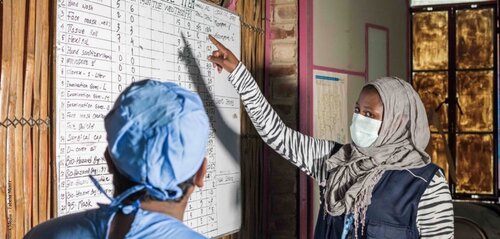UHC2030 hosted its annual UHC Day parliamentarian town hall to...
11 December 2020
Produced by the UHC2030 Fragile Settings Technical Working Group.

Around the world, over 1.8 billion people live in fragile settings. They include some of the world’s most vulnerable and marginalized people and communities. How are they being affected by the COVID-19 pandemic? What actions are needed to meet their needs during COVID-19 response and recovery? How can we work together towards the UHC Day vision of ‘Health Systems that Protect Everyone’ in these challenging contexts?
To address these issues, UHC2030 has produced a new policy brief on COVID-19 and fragile settings. It has three main messages. First, global guidance on COVID-19 response strategies should be adapted to context-specific and evolving needs in fragile settings. This may mean that actions to safely protect and restore other essential health services need to be prioritized, alongside feasible and proportionate COVID-19 control measures. Second, an urgent call to protect funding for health in fragile settings. Third, despite many unknowns in fragile settings, important practical lessons are emerging about how to enhance COVID-19 response and recovery. The brief includes six emergent lessons based on evidence and approaches to date.
The policy brief is based on a series of discussions of the UHC2030 Fragile Settings Technical Working Group from July to December 2020, and analysis and evidence contributed by group members. It reflects a multi-stakeholder collaboration to identify key principles and actions for stakeholders working on health in fragile settings. The group’s aim is that the new policy brief serves as a ‘shared script’ to inform decision-making by governments and agencies.
Policy brief: COVID-19 and fragile settings
Photo: @WHO/Blink Media/Fabeha Monir
More UHC2030 News
A global health financing emergency threatens progress toward...
UHC2030 at HSR2024: Advancing equity and inclusion in health systems through civil society knowledge
UHC2030, in collaboration with the SUPPORT-SYSTEMS research...
